
 |
|
|
#1 |
|
Member
Join Date: Jun 2009
Posts: 88
|
The auction's over and I bought the first one the seller listed. It's my first darb (my first sword, really) and it appears to be of good quality to my untrained eye...
http://cgi.ebay.com/ws/eBayISAPI.dll...=STRK:MEWAX:IT |
|
|

|
|
|
#2 |
|
Member
Join Date: Jul 2005
Location: Toronto, Canada
Posts: 1,242
|
Hello,
It seems all right. Distal taper, so forged blade, not stock removal. The seller doesn't say anything about the tang, whether it's forged or a welded rat-tail. The former is good, the latter very bad and potentially dangerous. Welded rat-tail tangs can be weak and they may snap off if you wave/hit the sword vigorously. Let us know how it feels when you receive it. Too bad about the copper habaki. A feature of Japanese nihonto, not thai/burmese dha. Maybe you could have found an old dha for the price. Regards, Emanuel Last edited by Emanuel; 7th August 2009 at 07:09 PM. Reason: Pic from auction |
|
|

|
|
|
#3 | |
|
Member
Join Date: Dec 2004
Posts: 1,247
|
Quote:
As some of you know, I happen to like Himalayan Import Khukuris, all of which now come with a habaki, even though they're made in Nepal by Nepalese kamis. The reason they do this is that, once they saw a habaki one someone's katana, they grabbed the idea, because it made for a better fit in the sheath, and it made it easier to fit the blade and hilt together, because they could cover and reinforce the join with the habaki, rather than fiddling to make sure everything fit perfectly, as they did on the old khukuris. So, I don't really blame modern bladesmiths for adding what they think are improvements to their work. I only grumble when someone tries to pass it off as traditional. For better or worse, I think the habaki's here to stay, and we're probably going to be seeing it on more and more blades as time goes by. F |
|
|
|

|
|
|
#4 |
|
Member
Join Date: Oct 2008
Posts: 385
|
Sword looks new. The habaki has a number on it. I smell China. They're making everything else, why not these? Thousands of copies, fakes, and fantasies, coming out of China. All forged. Amazing what you can accomplish, with modern technology, and free (slave) labor. It would boggle the mind, to know how many newly made swords, are in China as we speak. Er, type.

|
|
|

|
|
|
#5 |
|
Member
Join Date: Jul 2005
Location: Toronto, Canada
Posts: 1,242
|
This is a new sword of course, it is advertized as such, but it is not necessarily Chinese. A number of Thai firms and craftsmen are producing new dha and other swords, ranging from poor to quite good quality.
Fearn, the HI khukuri don't have habaki per se, just much larger bolsters. Traditional khukri were constructed in the same manner but with smaller bolsters/ferrules. These serve to reinforce the hilt-blade connection. The habaki serves only as a locking mechanism for the blade to sit in the scabbard without touching the scabbard's inner surfaces. I think in the dha above the habaki is there purely as a stylistic feature, mimicking in a way the more popular nihonto. Emanuel |
|
|

|
|
|
#6 |
|
Member
Join Date: Oct 2008
Posts: 385
|
Delete
Last edited by trenchwarfare; 7th August 2009 at 08:09 PM. |
|
|

|
|
|
#7 |
|
Member
Join Date: Oct 2008
Posts: 385
|
Delete
|
|
|

|
|
|
#8 |
|
Member
Join Date: Dec 2004
Posts: 987
|
This looks like a nicely-made modern daab. I very much doubt it is from China - as has been said there are a number of smiths around Thailand that still make daab. It looks quite solid. Please let us know how it feels once you have it in hand. Not a bad start to sword collecting, I think.

|
|
|

|
|
|
#9 |
|
Member
Join Date: Jun 2009
Posts: 88
|
I actually have it here with me
 Very sharp point, good slicing ability from the belly and the rattan wrap looks great. Since it was sent out directly from Chiang Mai, I really doubt it was made in China. It appears to be solid and handles quite well. Interesting point about the habaki--I thought I had quite a traditionally made darb on my hands! Thanks everyone! Very sharp point, good slicing ability from the belly and the rattan wrap looks great. Since it was sent out directly from Chiang Mai, I really doubt it was made in China. It appears to be solid and handles quite well. Interesting point about the habaki--I thought I had quite a traditionally made darb on my hands! Thanks everyone!BTW, is there any way I can find out what kind of tang this sword has? |
|
|

|
|
|
#10 |
|
Member
Join Date: Jul 2005
Location: Toronto, Canada
Posts: 1,242
|
Try to remove the handle
 It's a bit of work unwrapping the rattan, removing the brass ferrule and habaki, and even then the handle might be glued. Ask the seller. If you feel this is a good product and you say so, he shouldn't have any problem answering and giving you other construction details. |
|
|

|
|
|
#11 |
|
Member
Join Date: Jun 2009
Posts: 88
|
Thanks Emanuel, but I'd hate to mess the wrap up, so I'll try asking the seller first
 He seems like a cool guy. He seems like a cool guy.PS: this is me, not the seller  The pics of the darb, however, are the sellers', not mine. The pics of the darb, however, are the sellers', not mine.
Last edited by harimauhk; 8th August 2009 at 04:06 PM. |
|
|

|
|
|
#12 |
|
Member
Join Date: Mar 2006
Location: Room 101, Glos. UK
Posts: 4,183
|
i use a strong magnet on my dhas & darbs, if you slide it along the grip you can feel where it pulls on the tang. another way is to suspend the magnet on a string and move the grip across in front of it from the pommel, it'll start deflecting slightly when you reach the end of the tang.
not all have short stub tangs. 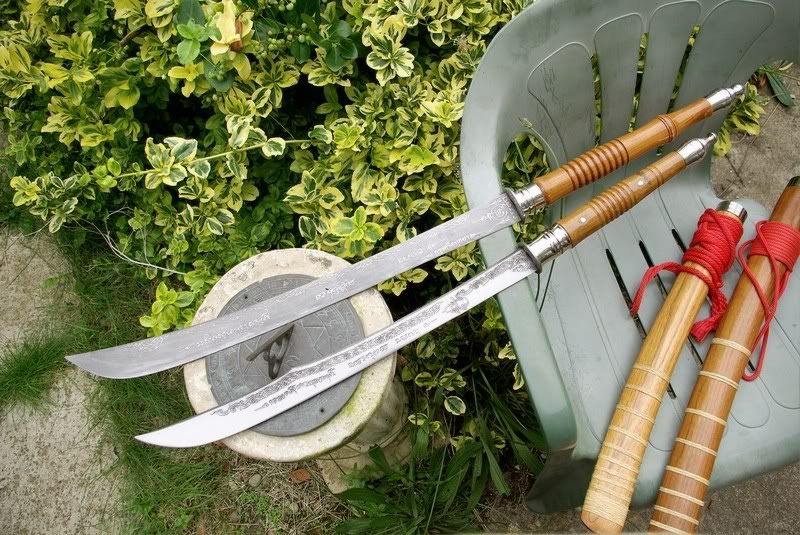 two from aranyik the top one here has a more traditional stub tang about 4in. long, with a steel rod welded to the end that is threaded to hold the heavy metal pommel. blade is differentially hardened, no habaki. heavy steel bolster to absorb the shock of a cut without breaking the handle. bottom one has a broad tang that extends most of the grip and is pinned in two places with1/4 in. steel pins, again the end has a small rod welded to it to hold the steel pommel. again no habaki and a very thick steel bolster. this one is built to take it. again, a differentially hardened steel blade, but this one was professionally polished. traditional dha/darb with 3-4in blind stub tangs worked on the battlefield for centuries, i'd not be afraid of using one like that, as long as the resin was in good shape... i've also seen them where the tang is actually a rod welded to the ricasso of the blade and ground down. avoid them like the plague. they can break under light handling and the flying blade knows no mercy. p.s. - nice picture of the wielder. the dha/darb is usually a one handed weapon, the long grip is used as a balance, and is normally held just behind the bolster. draw cuts are more normal as opposed to heavy chopping. they are designed for unarmoured or lightly armoured opponents in lightweight clothing. cutting down a tree is also not recommended. Last edited by kronckew; 8th August 2009 at 08:39 PM. |
|
|

|
|
|
#13 |
|
Member
Join Date: Jun 2009
Posts: 88
|
Hi kronckew,
Nice darbs  I have some strong magnets lying around so I'll try to work out what kind of tang I have later. That's a great idea (and one I never would have thought of). Thanks. I have some strong magnets lying around so I'll try to work out what kind of tang I have later. That's a great idea (and one I never would have thought of). Thanks.The wielder in the pic is me. I realize the darb is a one-handed weapon in most cases, and I also realize it is best used in a draw cut--trying to chop through a water bottle with it did not work, but it cuts like a razor. 
|
|
|

|
|
|
#14 | |
|
Member
Join Date: Aug 2007
Posts: 865
|
Quote:
Gone for a few days and look what fun I missed :P The seller is truthful in what he says, the sword is from Lampang, not China...I can vouch for that because I have a similar piece which I know it came from the Lampang, versus the more commonly found Aranyik style which kronckew has in the pictures he posted. These blades are better than the Aranyik daab, which have very little profile... they are more mass produced...more like a lawn mower blade...the Aranyik blades & handle feel very sturdy though...on the lampang piece I have I feel the handle could be a bit beefier...it would be interesting to know how they put the handle together. I have not heard of this old thai smith Go Neaw. The seller's claims that he is the best sword maker in Thailand seem a little much. Last edited by Nathaniel; 9th August 2009 at 05:16 AM. |
|
|
|

|
|
|
#15 |
|
Member
Join Date: Aug 2007
Posts: 865
|
Oh, and the habaki....true it's not traditional, but you do see this on some Thai hybrid swords due to Japanese influence...I will say though with the habaki, it does fit very nicely in the scabbard...and the overall finish work on the scabbard inside is much better...the aranyik ones are very rounghly done...in a generic shape to fit the different sword tips they make...so the aranyik blades all rattle in their scabbard and slide out very easily if tipped upside down...versus the Lampang one can be tipped upside down without any problem

|
|
|

|
|
|
#16 |
|
Member
Join Date: Jun 2009
Posts: 88
|
Hi Nathaniel,
Thanks for your input. I definitely like my darb and the sword will definitely not fall out of the scabbard. BTW, the pic of the guy with the sword is me. Dammit, every time I take a pic with one of my blades, someone gets a laugh out of it  Sent this pic of me with my badik to a friend of mine and she thanked me for making her laugh and helping relieve her exam stress.  Seller just got back to me and said it is definitely full-tang construction! I knew I had a keeper on my hands. |
|
|

|
|
|
#17 |
|
Member
Join Date: Aug 2007
Posts: 865
|
harimauhk,
Ooops, guess you saw my comment before I edited it...Hey I've had some good laughs to from others when I struck a deep kung fu pose in front of a Taoist temple :P but hey you got to have fun posing...  Yes, I think this is one of the better made daab in thailand. Some Thai forum members like Puff might be able to say more than I have about the smith, etc... I thought of another forum discussion which might be of interst...you can see an earlier model of the Lampang daab: http://www.vikingsword.com/ubb/Forum1/HTML/001291.html Also if you look on ebay there is another Lampang daab...not by the same seller your bought...but another seller from Bangkok.... |
|
|

|
|
|
#18 |
|
Member
Join Date: Aug 2007
Posts: 865
|
I should amend my comment and say the above regards the basic mass produced aranyik daab for the general tourist market...I understand they have to make what sells and keeps their business afloat...
Case in Point: Khun Dang's beautiful Cusom Aranyik Daab: http://www.vikingsword.com/vb/showthread.php?t=9228 And Jason's http://www.vikingsword.com/vb/showth...ht=custom+daab |
|
|

|
|
|
#19 | |
|
Member
Join Date: Aug 2007
Posts: 865
|
Quote:
To follow up on Emanuel's comment on the tang construction...here are some good explinations taken from Cozun out of Aranyik: Pictures of the different Tang Styles: 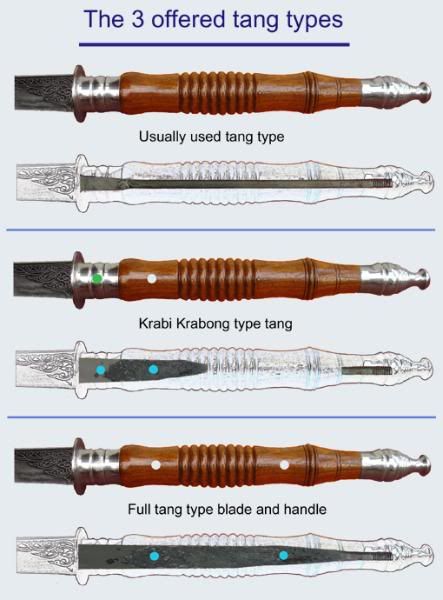 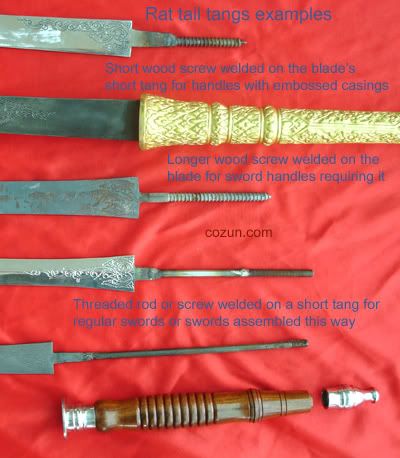 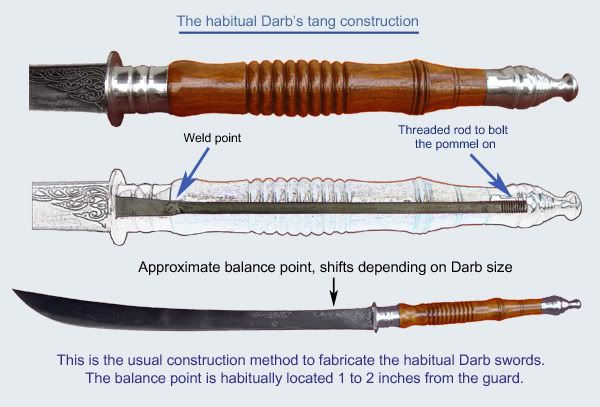 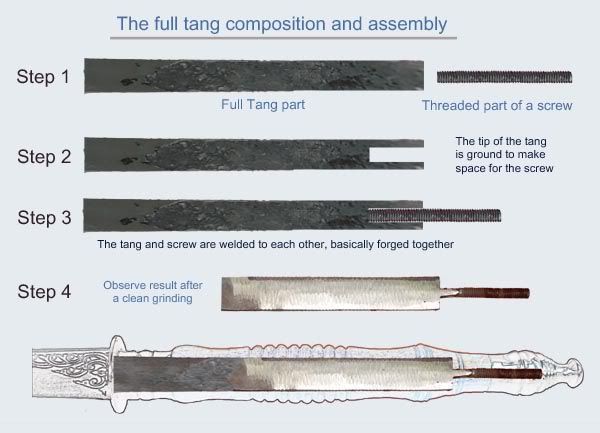 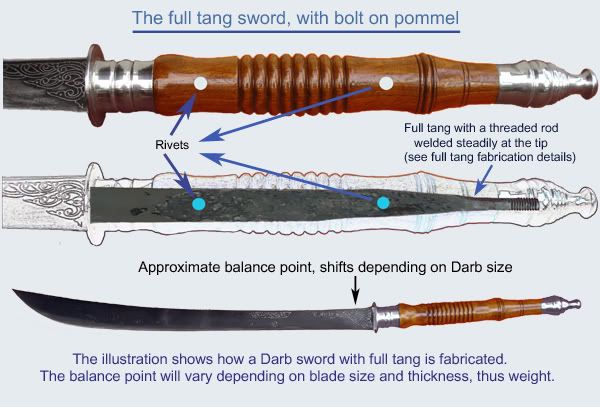 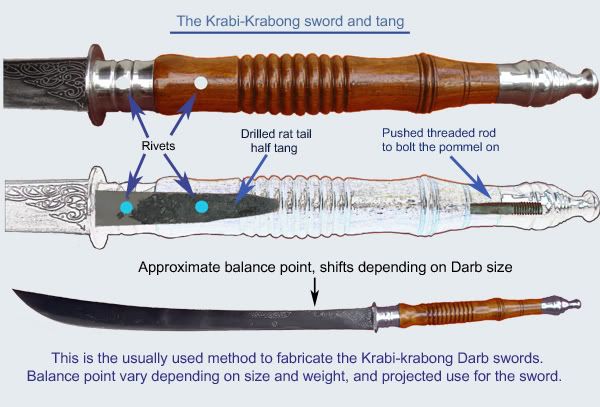
Last edited by Nathaniel; 9th August 2009 at 04:55 PM. |
|
|
|

|
|
|
#20 |
|
Member
Join Date: Jun 2009
Posts: 88
|
Thanks Nathaniel, I actually sent the seller the pics from cozun.com to help him out since Thai is his first language. I can't find the other Lampang daab on eBay though. Could you link me to it through PM?
|
|
|

|
|
|
#21 |
|
Member
Join Date: Dec 2004
Location: Oahu, Hawaii
Posts: 166
|
Nicely made modern darb up there in Chiang Mai - I just got back. And thanks Nathaniel for that link to Jason's piece. What a beauty!! Serge definitely has become the go-to guy out there for custom made work.
Dan |
|
|

|
|
|
#22 | |
|
Member
Join Date: Jun 2009
Posts: 88
|
Quote:

|
|
|
|

|
 |
|
|